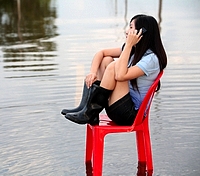Water leakage alarm limits damage
 You can prevent water damage to your home and contents by quickly detecting water leaks. Flooding can have unpleasant consequences and cause high costs. Water leakage is caused, for example, by faulty appliances and pipes.
You can prevent water damage to your home and contents by quickly detecting water leaks. Flooding can have unpleasant consequences and cause high costs. Water leakage is caused, for example, by faulty appliances and pipes.
Danger is also lurking from the outside: sewage that flows in, a leaking roof, broken drainage or flooding after a heavy rain shower... Sometimes there is moisture that gradually penetrates your home and causes mold or wood rot.
Image1: FreeDigitalPhotos.net
Alarm warns of water leakage
First of all, you should be alert to all appliances that use tap water, such as dishwasher, washing machine, water softener and water heater. You should also pay attention to the central heating boiler and places in the house that you do not visit very often, such as the attic and crawl space.
Also consider unheated areas with a risk of frozen water pipes. The basement, utility room, laundry room and bathroom are also susceptible to water leakage.
Alarm signal in case of water leakage
The simplest warning is an acoustic alarm. This means a screeching sound as soon as the detector has detected water. You can then take immediate action, for example turning off the (main) tap to prevent further water damage.
An acoustic alarm is an excellent solution in an inhabited house. There are simple water alarms for this, which work on a battery. You can place them anywhere in the house, for example under the central heating boiler or behind the dishwasher.
External notification in case of water leakage
If you want to monitor a place out of earshot, there are several options for transmitting the alarm. For example with a signal horn, a flash lamp or a signal to the surveillance system.
Shut off the water supply automatically
A water leak alarm with switch contact can stop the supply of tap water as soon as a leak occurs somewhere. To do this, connect a solenoid valve or shut-off valve to the switching contact. In the alarm condition, a supply voltage then goes to the valve, which in turn automatically blocks the water pipe. There are also valves with built-in water detection.
Water leakage alarm on battery or mains
Is there no mains voltage available? Or do you not want to install cables? In these situations we recommend the AquaDetect or another battery powered water alarm. You can easily move it or take it with you to the campsite or your holiday home. If the battery voltage becomes too low, the detector beeps. Then you need to install a new battery (9 Volt, common type, available everywhere).
For mobile applications, the 12 Volt version (eg connection to battery) is preferred. For fixed installations in buildings and for professional applications, it is best to use a 230 Volt water alarm.
Internal or external water leakage sensor
Simple water leak alarms have built-in moisture detectors. You can place them almost anywhere because they are compact. To check the operation, place the device briefly on a wet cloth or sponge. The buzzer should then produce a screeching sound. The alarm stops as soon as you lift the detector.